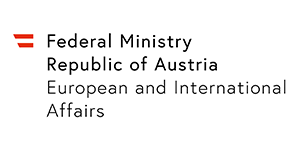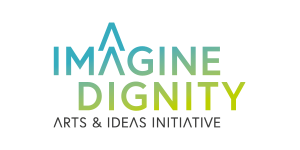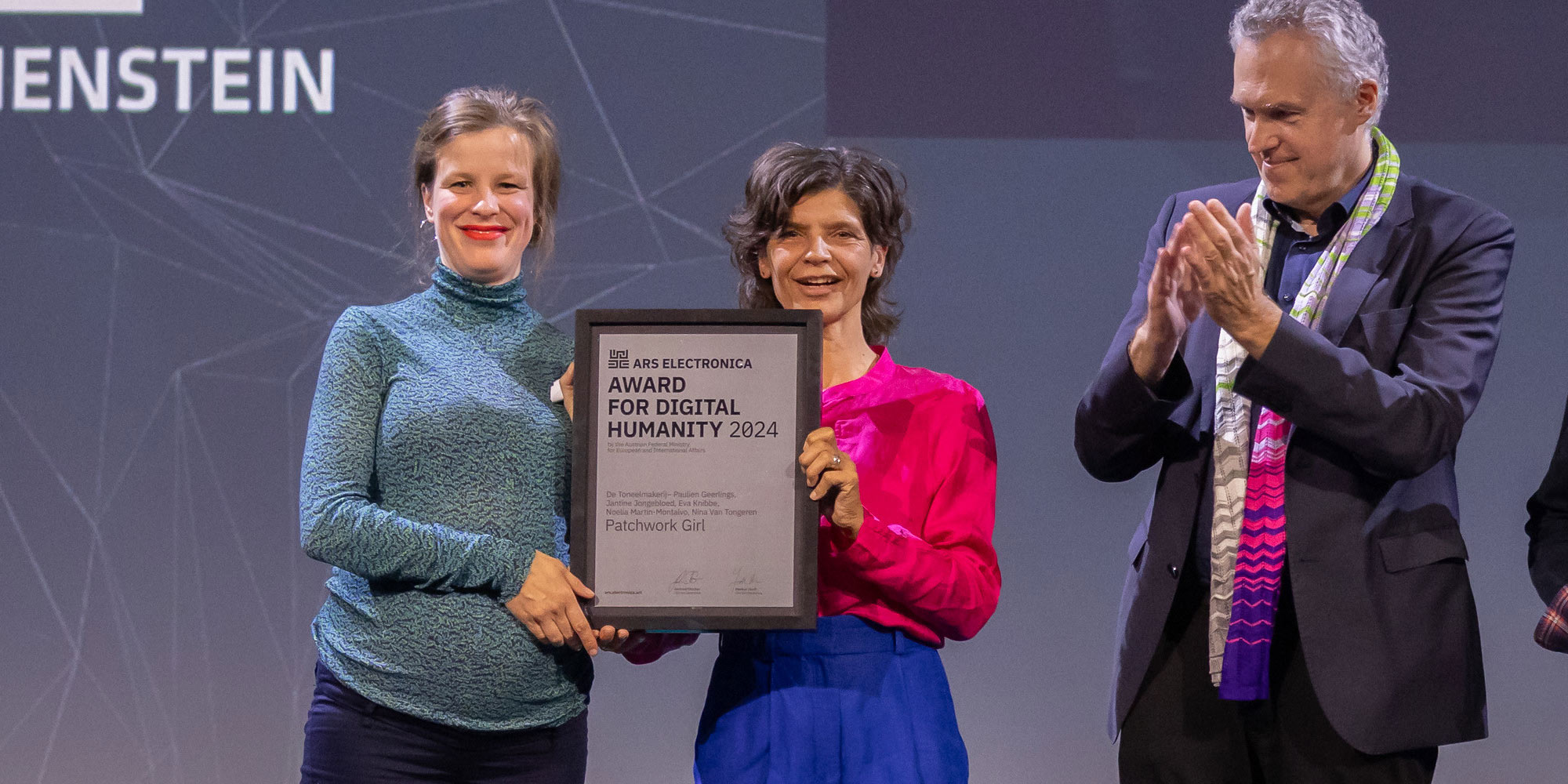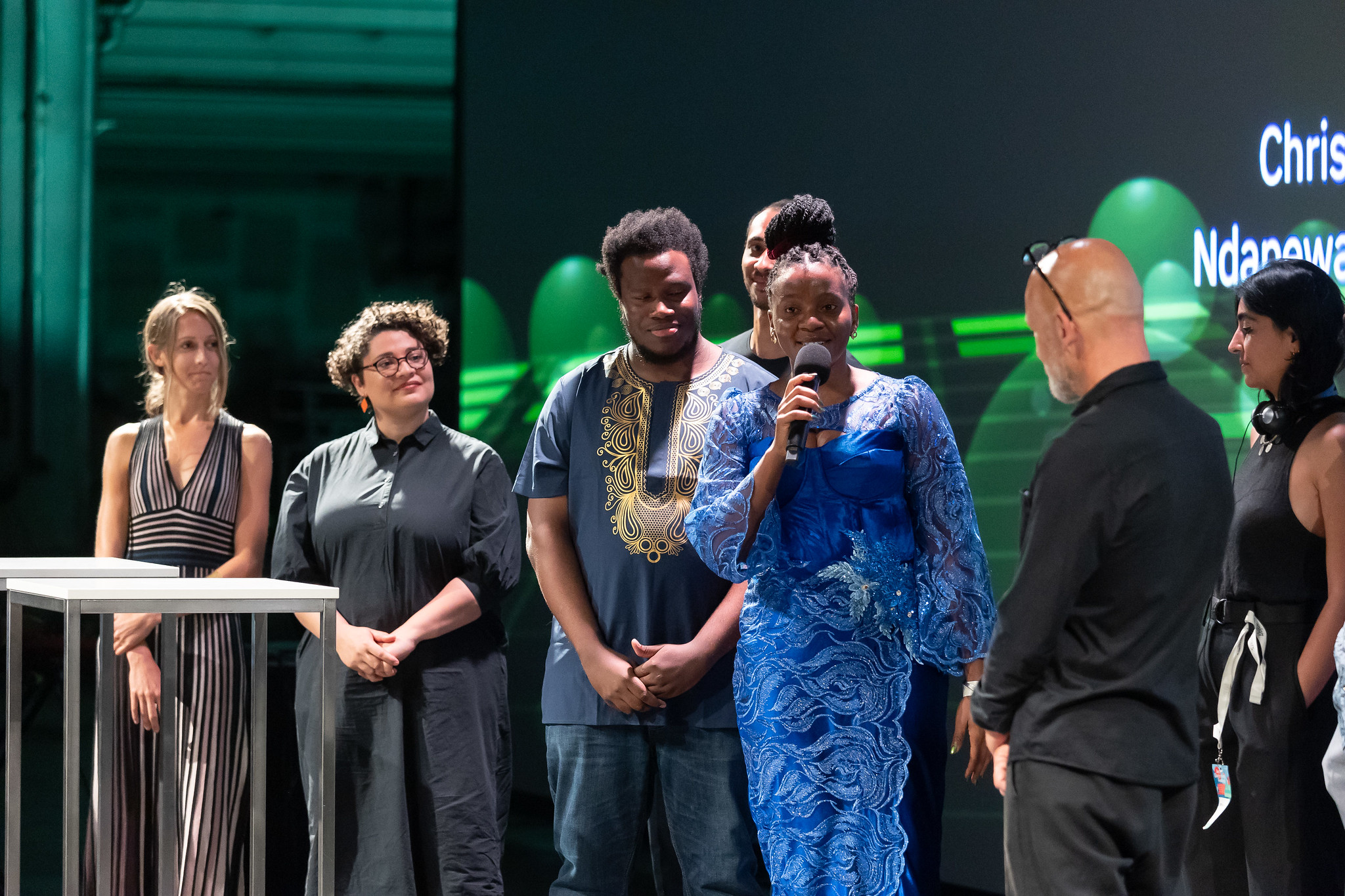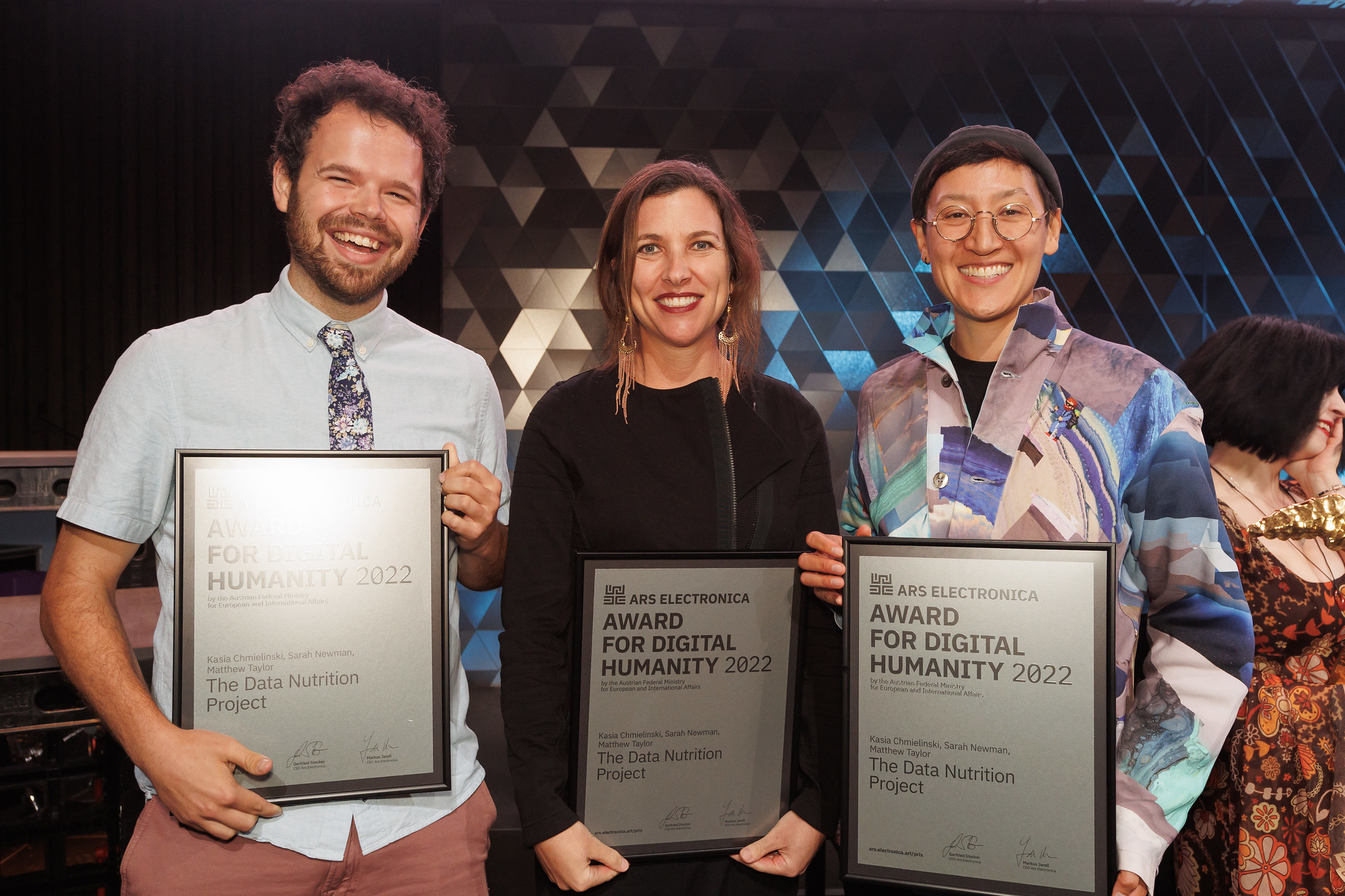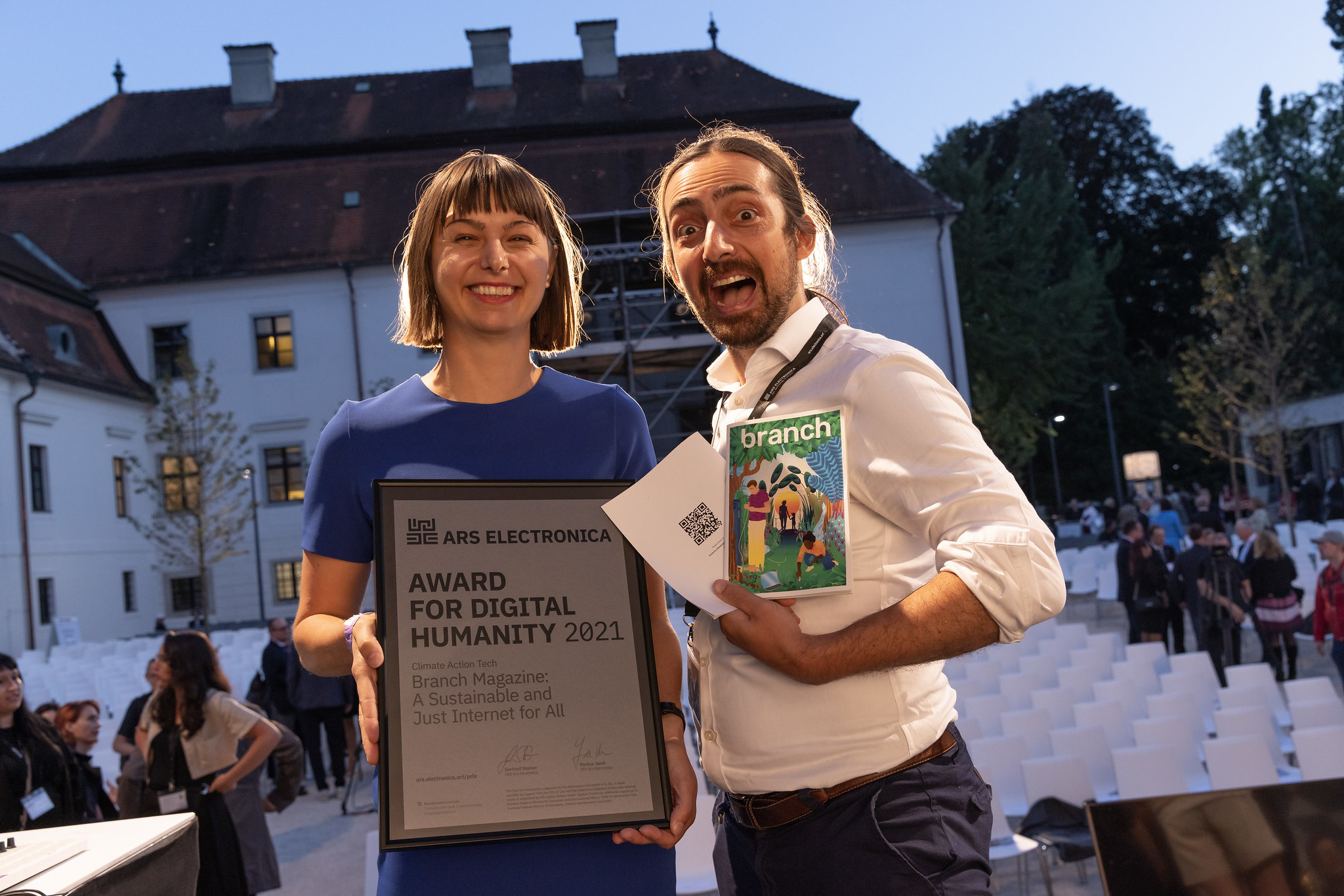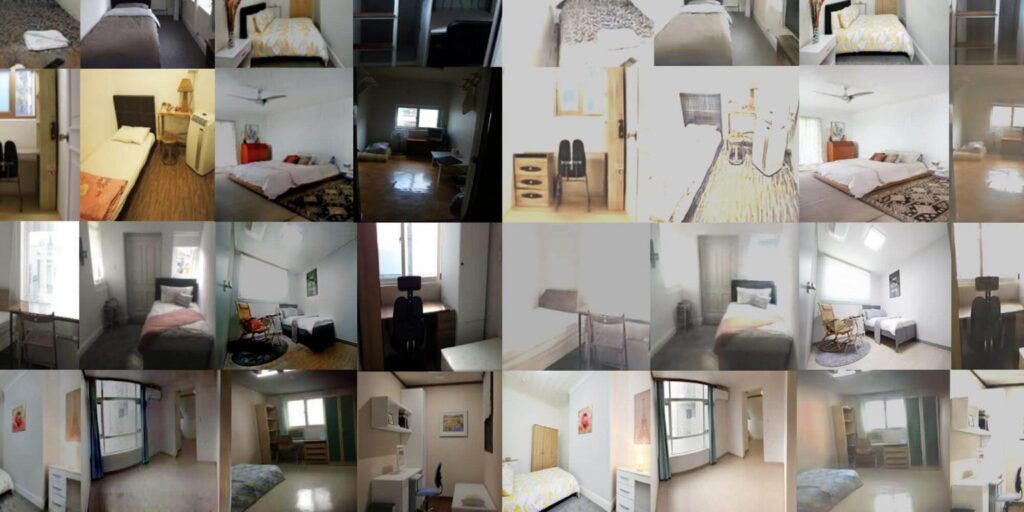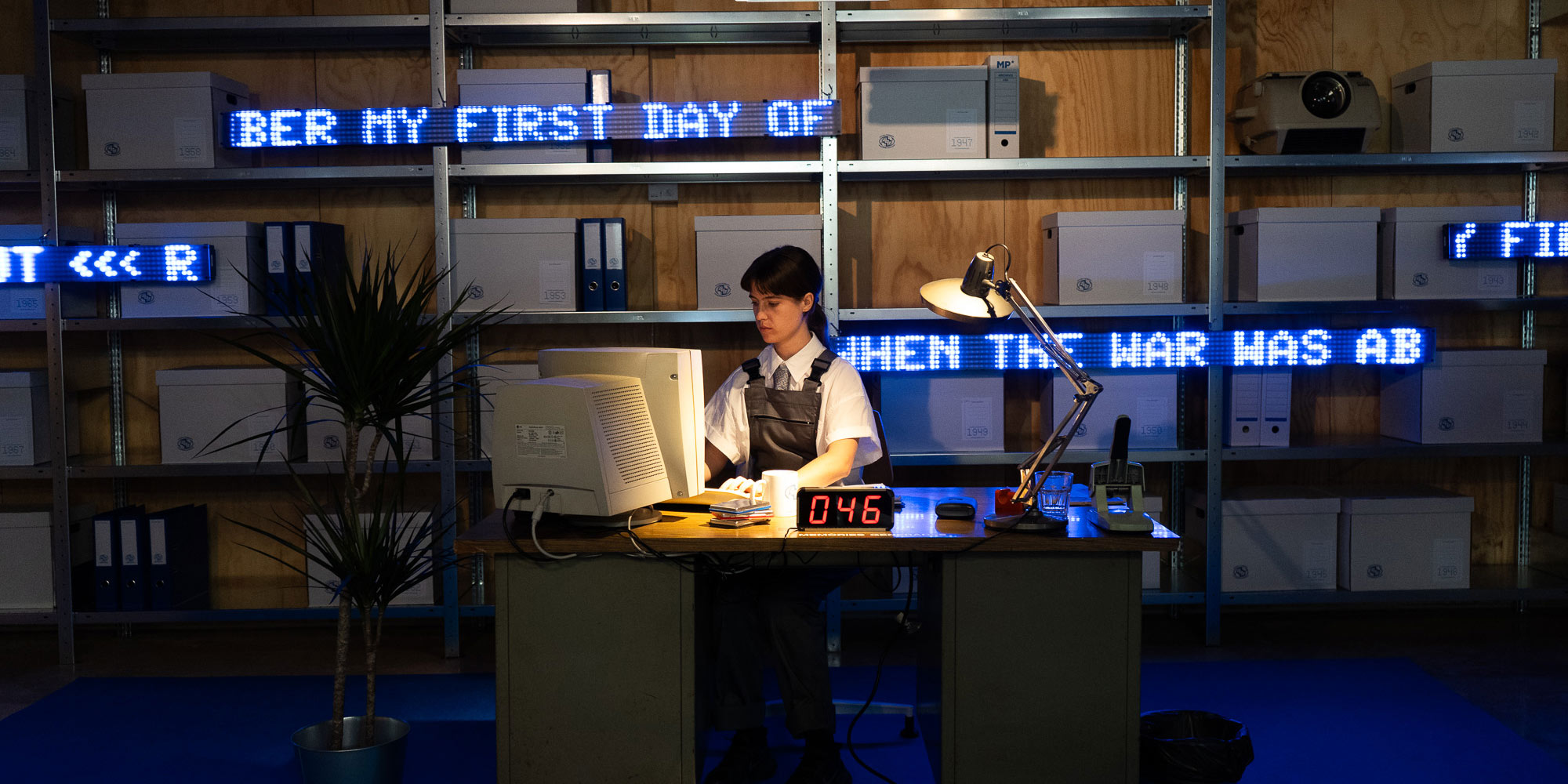
Ars Electronica Award for Digital Humanity
by the Austrian Federal Ministry for European and International Affairs
Synthetic Memories / Domestic Data Streamers (ES), Photo: Domestic Data Streamers
€ 10.000 prize money: Projects that demonstrate the power of cultural exchange and collaboration for the development of a human-centered digital world.
In addition to the Golden Nicas of Prix Ars Electronica 2025, the Ars Electronica Award for Digital Humanity, initiated by the Austrian Federal Ministry for European and International Affairs, were awarded for the fifth time as part of Prix Ars Electronica. Every submission to the Prix Ars Electronica and the S+T+ARTS Prize competition was also eligible for consideration for the Ars Electronica Award for Digital Humanity.
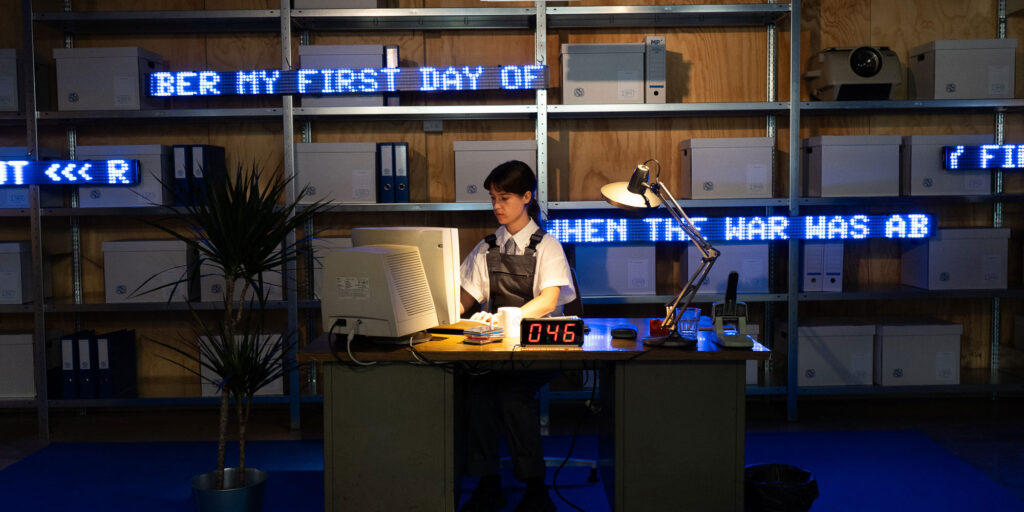
WINNER 2025
Synthetic Memories
Domestic Data Streamers (ES)
“Synthetic Memories is a socially engaged heritage preservation project that uses generative AI to reconstruct personal memories at risk of being lost—especially those never visually recorded. Through guided interviews, participants recount experiences, which are translated into AI-generated visuals that evolve through collaborative refinement.”
Photo: Domestic Data Streamers
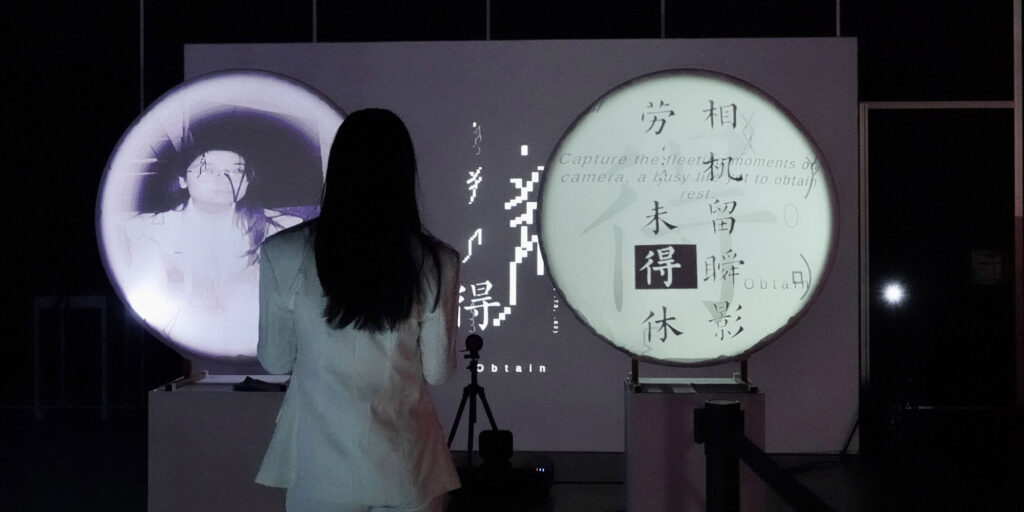
Honorary Mention 2025
AI Nüshu (AI女书)
Yuqian Sun (CN)
“AI Nüshu is a fantastic interactive art project that merges computational linguistics with the cultural legacy of Nüshu—a unique, centuries-old language developed and used exclusively by women in Hunan Province, China.”
Photo: Yuqian Sun
Art and culture shape our common reality. They pose the question of what constitutes a human being in the digital world. Artists as cultural ambassadors are best equipped to identify the potential and pitfalls of our current digital transformation.
Cultural diplomacy is a powerful instrument to promote mutual understanding among nations and bolster societal change on a global scale. As such, it is uniquely positioned to advocate for a new digital humanism: A digital humanism that builds a just and democratic society with humans at the center of technological progress. Digital humanism ensures our needs and universal human rights are being met and works to preserve our human dignity. It shapes technologies in accordance with human values and envisions alternative pathways for human/machine interaction that are centered around diversity and inclusion in the creation, implementation, and adaptation of digital tools.
The Ars Electronica Award for Digital Humanity emphasizes in equal terms the humaneness and humanism that must dictate the development of new technologies. The award honors projects and artworks that inspire a fundamental rethinking in our contemporary approach to technology: It’s time to resign our roles as mere data-generating machines and actively partake in the shaping of our digital future.
Could digital applications be more oriented towards human needs and based on cultural values that respect the autonomy of users over their data? Could software solutions build on the values of cultural diversity instead of infrastructural uniformity? Could digital tools be increasingly of benefit in cross-culture collaboration, international cultural relations, and mutual understanding?
The Digital Humanity Award focuses on artistic projects that address social, cultural, and humanitarian issues in our digital society. It highlights outstanding examples of collaborative practices between individuals of different disciplines and backgrounds. Jury members will pay particular attention to artistic projects that transcend the mere reflection on the effects of emerging technologies to evoke sources of inspiration, open up new pathways towards a new digital humanism, and create empowering role models.
For example (but not exclusively) the following projects can be submitted:
- art-science collaborations addressing global societal and humanitarian challenges
- tech & cultural diplomacy as well as advocacy projects
- artistic cross-border cooperation projects
- citizen/community involved or generated projects and artworks
- cultural diversity initiatives enabled through technologies
- social software, open-source projects
- cross-cultural educational projects
- artistic projects anchored in the areas of digital government, democracy, governance
- Human-centered AI projects and artworks
- projects from the fields of arts, culture and journalism which aim to increase quality, confidence in and competence in dealing with social media
- Projects that emphasize artistic technology solutions with an aim of safeguarding human rights, or point towards the UN’s sustainable development goals, or promote mutual understanding between different nations, minorities, and cultures.

Austria as an international platform for the fusion of art and technology
Credit: “Tycho; Test One” by Paul Friedlander, Photo: Ars Electronica / Martin Hieslmair
Starting in 2021, the BMEIA’s International Culture Department endows an annual prize of €10,000, which will be awarded by the Federal Minister for European and International Affairs and the Festival Ars Electronica at the Prix Ars Electronica Gala. With its commitment to digital humanism, Austria is establishing itself as an international platform for the fusion of art and technology (Culture Tech Hub), as provided for in the government program as an explicit goal.
New technologies must face up to an artistic debate or a humanistic worldview. Thus, new innovative applications, for example in the field of artificial intelligence (AI) or biotechnology, can be measured not only by their impact on our consumer behavior and the success of their business models, but also by their ethical, aesthetic and social orientation towards people and their well-being.
The prize fits programmatically into a new and innovative concept of international cultural relations and cultural diplomacy, which does not simply showcase national artistic or cultural production, but favors cultural exchange, people-to-people contacts and inter-cultural dialogue and cooperation. As a signature award of the Austrian Ministry of Foreign Affairs, it emphasizes the openness and outward-looking spirit of the Austrian cultural, scientific and technological ecosystem geared towards collaboration and awareness of our common global challenges.
It is precisely this future culture that aims to provide significant impetus through creative projects and groundbreaking dialogs and to establish strategic, intercultural partnerships. With this in mind, the Digital Humanism program focus was linked with the IMAGINE Arts & Ideas initiative of international culture in 2023. Both programs focus on the development of humanistic, eco-social approaches and strategies on the overarching topics of nature, people, democracy, economic development and international understanding in the age of artificial intelligence. The current program focus IMAGINE DIGNITY is also intended to build bridges between liberal democracies and other countries for dealing with the major issues of the future.
Digital Humanism
Digital Humanism wants to reflect new pathways to a digital society and invites audiences to imagine a new future: It’s time for us to resign our roles as mere consumers and data-generating machines. We must take responsibility for our futures. Couldn’t applications of digital technology oriented towards human needs and established social conventions, which respect the autonomy of users over their data, be just this competitive advantage? Or, in other words: Is it possible to create a digital society that fosters competition and generates value while also reflecting European values?
The global tech industry has been in a crisis for some time now, reflecting an overload of our society with the impact of new technologies (fake news, human downgrading, cyber crime, trade in personal data, etc.). The worldwide backlash (“techlash”) against the tech industry has now become a serious image problem for global internet platforms such as Facebook, Google and Co. In addition, surveillance systems such as AI-based face recognition are being used more and more openly in authoritarian ruled countries (e.g. China) to suppress human rights and for social control. A trend that has even been exacerbated in some countries by the opportunities and requirements in times of global pandemics.
For a new digital humanism, art and human creativity are irreplaceable as essential allies. In their dual function as humanists and futurists, artists are uniquely predestined to exert a positive influence on the development of technological innovation through artistic thinking and critical, unconventional reflection (thinking out-of-the-box).
Find more information on Ars Electronica’s European Platform for Digital Humanism:
- European Platform for Digital Humanism at the Ars Electronica Festival 2019
- European Platform for Digital Humanism at the Ars Electronica Festival 2020
- European Platform for Digital Humanism at the Ars Electronica Festival 2021
- Ars Electronica Award for Digital Humanity 2022 at the Ars Electronica Festival 2022
- European Platform for Digital Humanism at the Ars Electronica Festival 2023
- Ars Electronica Platform Europe
- Ars Electronica Blog
Past Winners
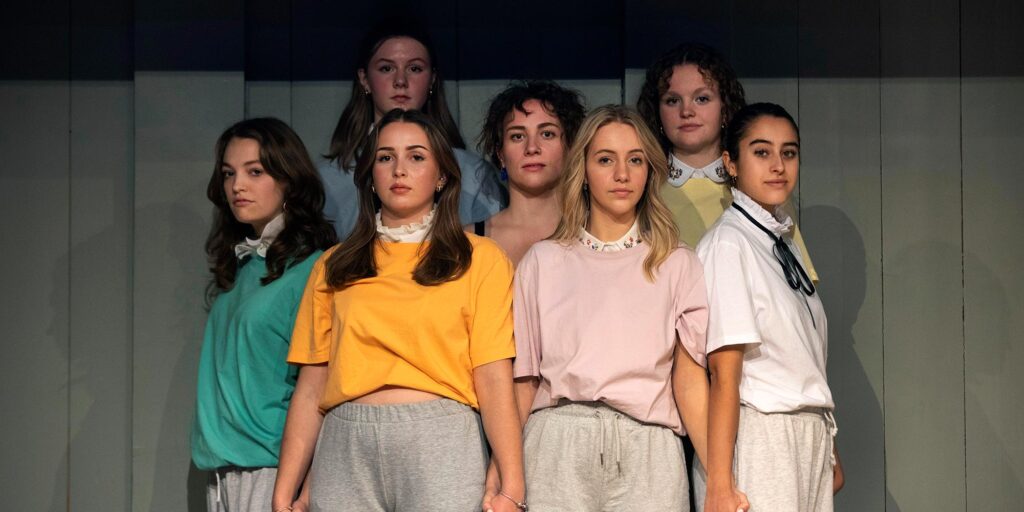
WINNER 2024
Patchwork Girl
De Toneelmakerij (NL) – Paulien Geerlings (NL), Jantine Jongebloed (NL), Eva Knibbe (NL), Noelía Martin-Montalvo (ES), Nina Van Tongeren (NL)
“Patchwork Girl excels in promoting human-centered, collaborative practices and cross-disciplinary engagement, aligning perfectly with the Ars Electronica Award for Digital Humanity’s objectives. It transcends mere reflection on technology’s effects, advocates for systemic change in digital spaces, and opens new pathways towards the protection of human dignity.”
Photo: Sanne Peper

Honorary Mention 2024
AI and the Art of Historical Reinterpretation – Filling Gender Bias Gaps
Claudia Larcher (AT)
“This project stands as a powerful example of how AI can be harnessed to empower marginalized groups and reshape our understanding of history.”
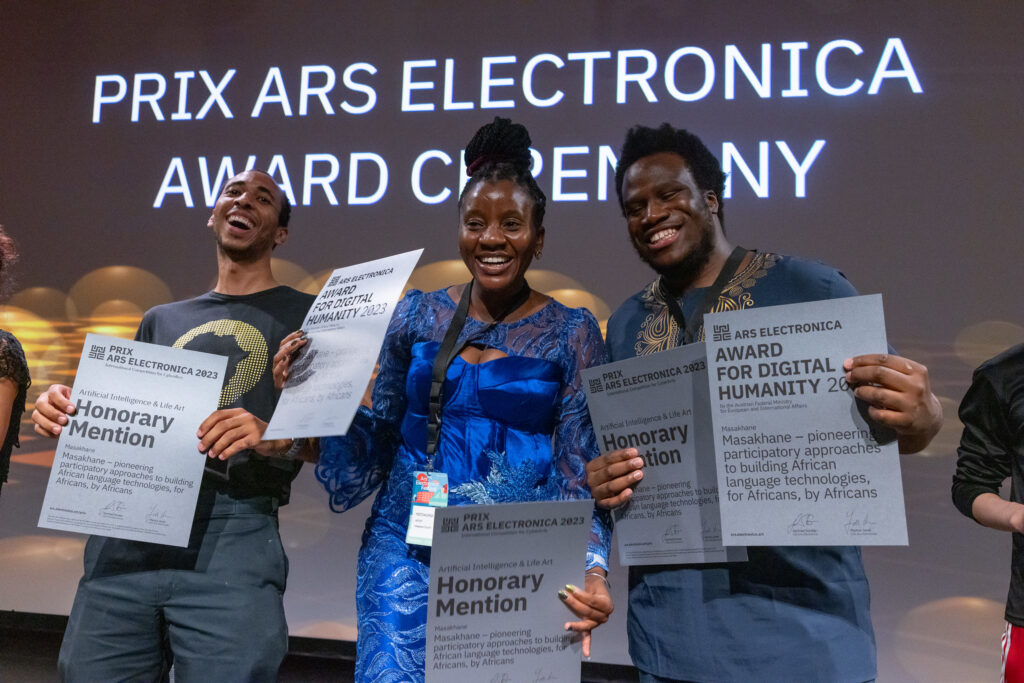
Winner 2023
Masakhane—pioneering participatory approaches to building African language technologies, for Africans, by Africans
Masakhane (INT)
More than 2,000 languages are spoken on the African continent, but they are hardly represented in machine translation and communication programs. The after-effects of the colonial past are evident here in the lack of consideration given to African languages. The organization Masakhane (isiZulu for “We build together”) is working to counter this development by contributing to NLP (Natural Language Processing) research.
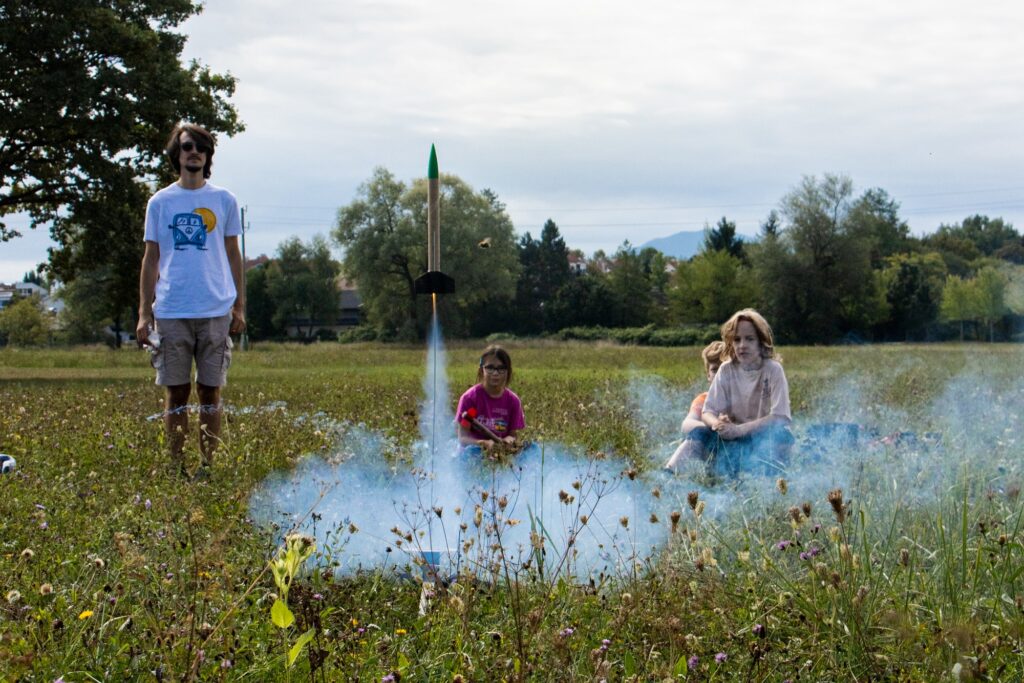
Honorary Mention 2023
konS ≡ PARK – Academy for Contemporary Investigative Art
konS ≡ PARK – Academy for contemporary investigative art
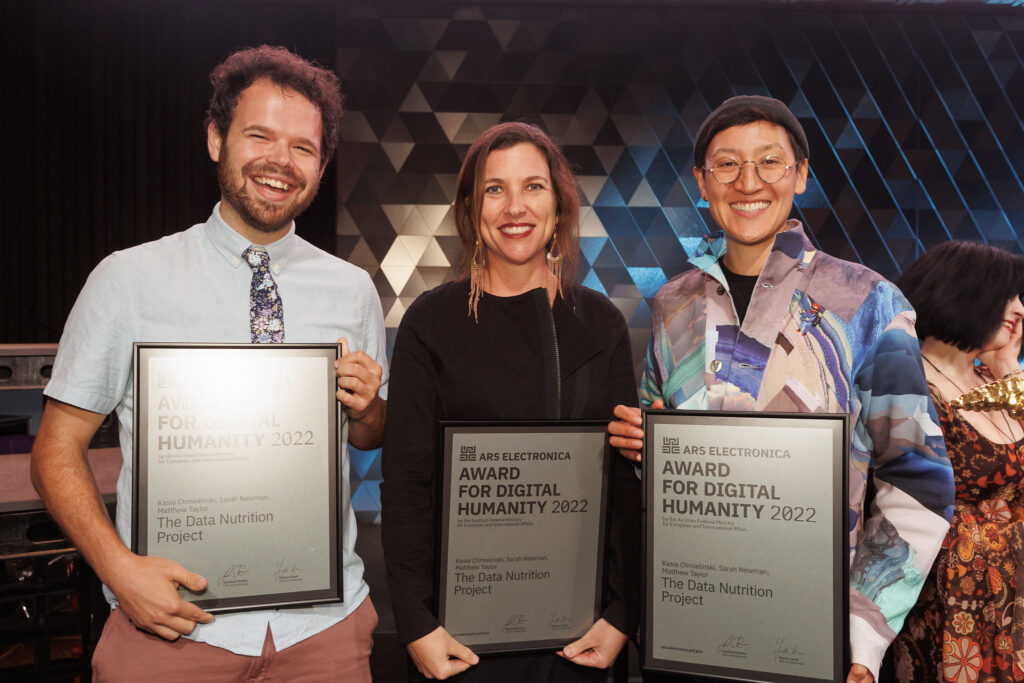
Winner 2022
The Data Nutrition Project
Sarah Newman (US), Kasia Chmielinski (US), Matthew Taylor (US)
The Data Nutrition Project is an initiative of technologists, artists, scientists, and practitioners that aims to enable faster and better assessment of datasets: the “Dataset Nutrition Label” awarded is comparable to the nutrition label for food and contains essential information about the dataset at hand. In addition to developing digital labels and an engine to create them, the team is also working on educational initiatives, a children’s book, and a podcast. All of these initiatives are intended to create awareness of existing problems in AI systems and contribute to solving them.
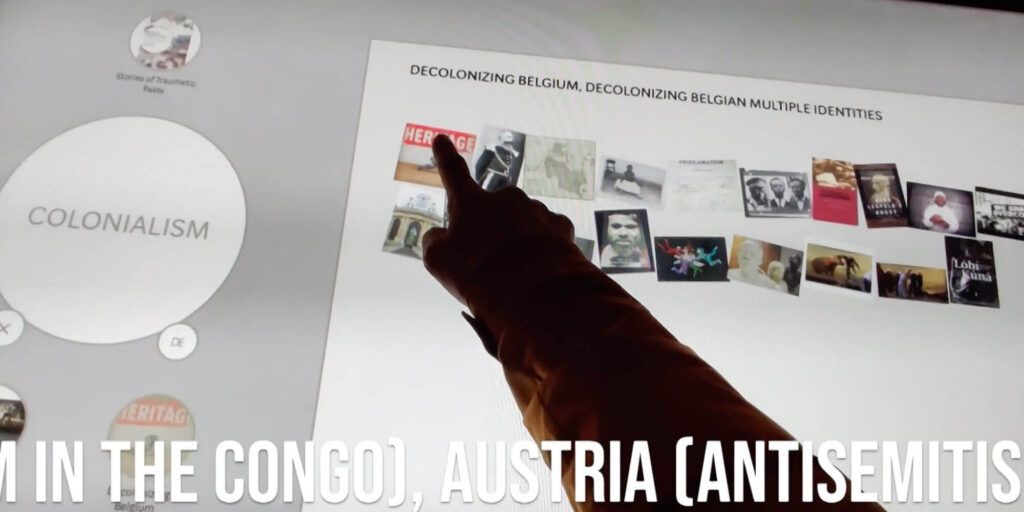
Honorary Mention 2022
Digital Research Travelogues through European Archives
Marina Gržinić, Jovita Pristovšek, Sophie Uitz (INT)
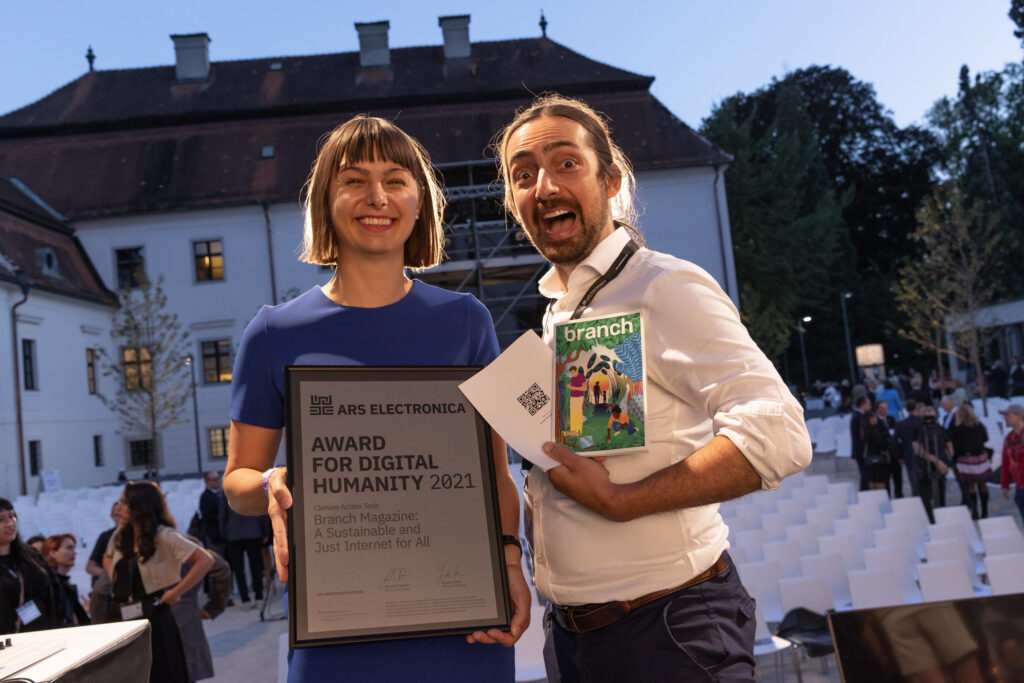
Winner 2021
Branch Magazine: A Sustainable and Just Internet for All
Climate Action Tech (EU/Global)
The internet is the world’s largest fossil fuel-powered machine. If we continue business-as-usual, the IT sector will be responsible for 14% of the world’s carbon emissions by 2040. The creators of “Branch Magazine,” on the other hand, have a different vision for the future of the WWW: the Internet should serve our collective liberation and be committed to ecological sustainability. The online magazine “Branch” is intended to make a contribution to this.
Juries
Regina Rusz is an Austrian diplomat and currently heads the General Directorate for international cultural relations at the Austrian Foreign Ministry. She has worked at embassies and cultural forums in Croatia, Serbia, Hungary and Slovakia, among others. The advancement of women is, and always has been, an important concern in her professional activities as Director of the Cultural Forums in Budapest (2017-2020) and Belgrade (2001-2005), she is one of the founders of the programme “Calliope.jointhedots” (www.calliope.at) which aims at supporting female Austrian artists and scientists abroad. From 2008-2012, she was a member of the Austrian Task Force for Combating Human Trafficking at the Ministry of Foreign Affairs.
Katalin Tünde Huber is the Director of the Department for cultural and scientific programmes abroad at the Austrian Foreign Ministry, where she is responsible for coordinating the cultural activities of the Austrian Cultural Forums and Embassies. From 2017-2020 she served as Director of the Austrian Cultural Forum London. Before engaging in arts and culture, she focused on EU affairs and the Western Balkans region. She worked at the Austrian Permanent Representations to the EU (Brussels) and to the United Nations (New York). She studied Political Science, Hungarian and French and worked for the Stability Pact for South Eastern Europe.
Thomas Kloiber, born in 1972 Graz/Austria, studied catholic theology at the University of Vienna and at the Facultad de Teología del Norte de España Burgos. Before he joined the Austrian Federal Ministry for European and International Affairs in 2008, he worked as high school teacher for religion and as educational trainer for students of catholic theology. He worked from 2003 to 2006 as General Secretary of the Federation of Catholic Family Associations ion Europe. As employee of the Austrian Federal Ministry for European and International Affairs he served at the Austrian Embassies in Washington D.C. and in Moscow as well as at the Cultural Forums in Tehran and Bucharest.
Gerfried Stocker is a media artist and an engineer for communication technology and has been artistic director and co-CEO of Ars Electronica since 1995. In 1995/96 he developed the exhibition strategies of the Ars Electronica Center with a small team of artists and technicians and was responsible for the setup and establishment of Ars Electronica’s own R & D facility, the Ars Electronica Futurelab. He has overseen the development of the program for international Ars Electronica exhibitions since 2004, the planning and the revamping of the contents for the Ars Electronica Center, which was enlarged in 2009, since 2005; the expansion of the Ars Electronica Festival since 2015; and the extensive overhaul of Ars Electronica Center’s contents and interior design in 2019. Stocker is a consultant for numerous companies and institutions in the field of creativity and innovation management and is active as a guest lecturer at international conferences and universities. In 2019 he was awarded an honorary doctorate from Aalto University, Finland.
Veronika Liebl is currently Managing Director at the department Festival/Prix/Exhibitions of Ars Electronica. She studied economic and business science at Johannes Kepler University in Linz (graduated in 2010) with study visits at Harvard University (US) and Université de Fribourg (CH) and has an interdisciplinary background in non-profit and innovation management. Since 2011 she is in charge of cultural management and European project development at Ars Electronica Linz and serves as a member for the Linz’ city culture council and Linz’ UNESCO City of Media Arts Executive Board. She leads Ars Electronica’s European collaboration projects in the field of culture, research & education and developed, launched as well as executed in this position – together with her team – numerous EU projects such as the STARTS Prize, DOORS (Digital Incubator for Museums) or the European ARTificial Intelligence Lab.
Ambassador Christoph Thun-Hohenstein (born 1960) is Director General for International Cultural Relations at the Federal Ministry for European and International Affairs of the Republic of Austria. After studying law, political science, and history of art at the University of Vienna, Thun-Hohenstein worked for the Austrian Foreign Ministry and held posts in Abidjan, Geneva, and Bonn. He was Director of the Austrian Cultural Forum New York from 1999 to 2007. From 2007 to 2011, he served as Managing Director of departure, the Creative Agency of the City of Vienna. From 2011 to 2021, Thun-Hohenstein was General Director and Artistic Director of the MAK – Austrian Museum of Applied Arts, Vienna. He initiated the Vienna Biennale for Change, which he directed from 2014 until 2022. Most recently, he initiated the Vienna Climate Biennale, which will take place for the first time from April through July 2024. Thun-Hohenstein has published on topics dealing above all with European integration, contemporary arts and culture, digital modernity, climate care, and circular culture and held numerous lectures on these topics. He has also curated exhibitions and he regularly serves on selection juries.
Regina Rusz is an Austrian diplomat and currently heads the department for cultural and scientific events abroad at the Austrian Foreign Ministry. She has worked at embassies and cultural forums in Croatia, Serbia, Hungary and Slovakia, among others. The advancement of women is, and always has been, an important concern in her professional activities as Director of the Cultural Forums in Budapest (2017-2020) and Belgrade (2001-2005), From 2008-2012, she was a member of the Austrian Task Force for Combating Human Trafficking at the Ministry of Foreign Affairs.
Thomas Kloiber, born in 1972 Graz/Austria, studied catholic theology at the University of Vienna and at the Facultad de Teología del Norte de España Burgos. Before he joined the Austrian Federal Ministry for European and International Affairs in 2008, he worked as high school teacher for religion and as educational trainer for students of catholic theology. He worked from 2003 to 2006 as General Secretary of the Federation of Catholic Family Associations ion Europe. As employee of the Austrian Federal Ministry for European and International Affairs he served at the Austrian Embassies in Washington D.C. and in Moscow as well as at the Cultural Forums in Tehran and Bucharest.
Gerfried Stocker (AT) is a media artist and an engineer for communication technology and has been artistic director and co-CEO of Ars Electronica since 1995. In 1995/96 he developed the exhibition strategies of the Ars Electronica Center with a small team of artists and technicians and was responsible for the setup and establishment of Ars Electronica’s own R & D facility, the Ars Electronica Futurelab. He has overseen the development of the program for international Ars Electronica exhibitions since 2004, the planning and the revamping of the contents for the Ars Electronica Center, which was enlarged in 2009, since 2005; the expansion of the Ars Electronica Festival since 2015; and the extensive overhaul of Ars Electronica Center’s contents and interior design in 2019. Stocker is a consultant for numerous companies and institutions in the field of creativity and innovation management and is active as a guest lecturer at international conferences and universities. In 2019 he was awarded an honorary doctorate from Aalto University, Finland.
Veronika Liebl (AT) is currently Managing Director at the department Festival/Prix/Exhibitions of Ars Electronica. She studied economic and business science at Johannes Kepler University in Linz (graduated in 2010) with study visits at Harvard University (US) and Université de Fribourg (CH) and has an interdisciplinary background in non-profit and innovation management. Since 2011 she is in charge of cultural management and European project development at Ars Electronica Linz and serves as a member for the Linz’ city culture council and Linz’ UNESCO City of Media Arts Executive Board. She leads Ars Electronica’s European collaboration projects in the field of culture, research & education and developed, launched as well as executed in this position – together with her team – numerous EU projects such as the STARTS Prize, DOORS (Digital Incubator for Museums) or the European ARTificial Intelligence Lab.
Ambassador Christoph Thun-Hohenstein (born 1960) is Director General for International Cultural Relations at the Federal Ministry for European and International Affairs of the Republic of Austria. After studying law, political science, and history of art at the University of Vienna, Thun-Hohenstein worked for the Austrian Foreign Ministry and held posts in Abidjan, Geneva, and Bonn. He was Director of the Austrian Cultural Forum New York from 1999 to 2007. From 2007 to 2011, he served as Managing Director of departure, the Creative Agency of the City of Vienna. From 2011 to 2021, Thun-Hohenstein was General Director and Artistic Director of the MAK – Austrian Museum of Applied Arts, Vienna. He initiated the Vienna Biennale for Change, which he directed from 2014 until 2022. Most recently, he initiated the Vienna Climate Biennale, which will take place for the first time from April through July 2024. Thun-Hohenstein has published on topics dealing above all with European integration, contemporary arts and culture, digital modernity, climate care, and circular culture and held numerous lectures on these topics. He has also curated exhibitions and he regularly serves on selection juries.
Regina Rusz is an Austrian diplomat and currently heads the department for cultural and scientific events abroad at the Austrian Foreign Ministry. She has worked at embassies and cultural forums in Croatia, Serbia, Hungary and Slovakia, among others. The advancement of women is, and always has been, an important concern in her professional activities as Director of the Cultural Forums in Budapest (2017-2020) and Belgrade (2001-2005), From 2008-2012, she was a member of the Austrian Task Force for Combating Human Trafficking at the Ministry of Foreign Affairs.
Thomas Kloiber, born in 1972 Graz/Austria, studied catholic theology at the University of Vienna and at the Facultad de Teología del Norte de España Burgos. Before he joined the Austrian Federal Ministry for European and International Affairs in 2008, he worked as high school teacher for religion and as educational trainer for students of catholic theology. He worked from 2003 to 2006 as General Secretary of the Federation of Catholic Family Associations ion Europe. As employee of the Austrian Federal Ministry for European and International Affairs he served at the Austrian Embassies in Washington D.C. and in Moscow as well as at the Cultural Forums in Tehran and Bucharest.
Gerfried Stocker (AT) is a media artist and an engineer for communication technology and has been artistic director and co-CEO of Ars Electronica since 1995. In 1995/96 he developed the exhibition strategies of the Ars Electronica Center with a small team of artists and technicians and was responsible for the setup and establishment of Ars Electronica’s own R & D facility, the Ars Electronica Futurelab. He has overseen the development of the program for international Ars Electronica exhibitions since 2004, the planning and the revamping of the contents for the Ars Electronica Center, which was enlarged in 2009, since 2005; the expansion of the Ars Electronica Festival since 2015; and the extensive overhaul of Ars Electronica Center’s contents and interior design in 2019. Stocker is a consultant for numerous companies and institutions in the field of creativity and innovation management and is active as a guest lecturer at international conferences and universities. In 2019 he was awarded an honorary doctorate from Aalto University, Finland.
Veronika Liebl (AT) is currently Managing Director at the department Festival/Prix/Exhibitions of Ars Electronica. She studied economic and business science at Johannes Kepler University in Linz (graduated in 2010) with study visits at Harvard University (US) and Université de Fribourg (CH) and has an interdisciplinary background in non-profit and innovation management. Since 2011 she is in charge of cultural management and European project development at Ars Electronica Linz and serves as a member for the Linz’ city culture council and Linz’ UNESCO City of Media Arts Executive Board. She leads Ars Electronica’s European collaboration projects in the field of culture, research & education and developed, launched as well as executed in this position – together with her team – numerous EU projects such as the STARTS Prize, DOORS (Digital Incubator for Museums) or the European ARTificial Intelligence Lab.
Martin Honzik is an artist and director of Ars Electronica’s Festival, Prix and Exhibitions divisions. He studied visual experimental design at Linz Art University (graduated in 2001) and completed the master’s program in culture & media management at the University of Linz and ICCM Salzburg (graduated in 2003). From 1998 to 2001, he was a member of the production team at the OK Center for Contemporary Art. In 2001, he joined the staff of the Ars Electronica Futurelab, where, until 2005, his responsibilities included exhibition design, art in architecture, interface design, event design and project management. Since 2006, Martin Honzik has been director of the Ars Electronica Festival and the Prix Ars Electronica and in charge of exhibitions in the Ars Electronica Center as well as Ars Electronica’s international exhibition projects.
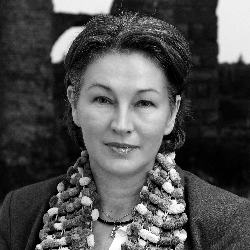
Teresa Indjein was born in Vienna. She studied law, music and languages and has worked in France, Poland, the US, Germany and Italy. She is Director General for International Cultural Affairs at the Austrian Ministry for Foreign Affairs.

Sonja Reiser-Weinzettl is head of unit V.2b – Exhibitions and Digital Media at the Austrian Ministry for Foreign Affairs. She studied Educational Science and is currently studying Image Science in Krems. She has worked in the UK, Czechia and Slovenia.

Gerfried Stocker is a media artist and an engineer for communication technology and has been artistic director and co-CEO of Ars Electronica since 1995. In 1995/96 he developed the exhibition strategies of the Ars Electronica Center with a small team of artists and technicians and was responsible for the setup and establishment of Ars Electronica’s own R & D facility, the Ars Electronica Futurelab. He has overseen the development of the program for international Ars Electronica exhibitions since 2004, the planning and the revamping of the contents for the Ars Electronica Center, which was enlarged in 2009, since 2005; the expansion of the Ars Electronica Festival since 2015; and the extensive overhaul of Ars Electronica Center’s contents and interior design in 2019. Stocker is a consultant for numerous companies and institutions in the field of creativity and innovation management and is active as a guest lecturer at international conferences and universities. In 2019 he was awarded an honorary doctorate from Aalto University, Finland.

Martin Honzik is an artist and director of Ars Electronica’s Festival, Prix and Exhibitions divisions. He studied visual experimental design at Linz Art University (graduated in 2001) and completed the master’s program in culture & media management at the University of Linz and ICCM Salzburg (graduated in 2003). From 1998 to 2001, he was a member of the production team at the OK Center for Contemporary Art. In 2001, he joined the staff of the Ars Electronica Futurelab, where, until 2005, his responsibilities included exhibition design, art in architecture, interface design, event design and project management. Since 2006, Martin Honzik has been director of the Ars Electronica Festival and the Prix Ars Electronica and in charge of exhibitions in the Ars Electronica Center as well as Ars Electronica’s international exhibition projects.
FAQs
What can be submitted?
- Groundbreaking artistic projects involving at least 2 collaborating artists, researchers or technologists driven by or resulting in digital humanity.
- A priority of the award are further those projects involving collaborators from two different nationalities/cultures or projects addressing a novel, artistic way of bridging cultures and strengthening cultural diversity in our digital society.
- Submission is only possible through entering in one of the Prix Ars Electronica or S+T+ARTS Prize categories. The Ars Electronica Award for Digital Humanity will be, however, evaluated through an individual jury.
- Projects should not be older than two years or have to show a significant update or further development within the last two years.
According to which criteria are the entries judged?
- Quality of the artistic work and its potential influence on technology
- Quality and success of the collaborative practice
- Quality and sustainable impact for the areas of digital humanity and tech diplomacy
- Relevance and level of innovation & originality of the submitted work
- General criteria such as aesthetics, originality, convincing concept, innovation and the technique and quality of the presentation
How can I submit?
The submission deadline for the 2025 Ars Electronica Award for Digital Humanism is the same as for 2025 Prix Ars Electronica: March 10, 2025, 11:59 PM CET (extended deadline).
Proposal reception is only possible by using the foreseen submission platform and templates through one of the Prix Ars Electronica or S+T+ARTS Prize categories without exceptions. Submitters will receive a registration information, an acknowledgement of receipt of the submission, an information when the call is closed and an information on the decision of the selection through the platform.
What is the prize amount?
The winner of the Ars Electronica Award for Digital Humanity will be awarded with €10.000,- prize money.
Who can enter?
Artists / creative professionals (no matter if individuals or groups) or associations, public institutions, NGO and private enterprises clearly demonstrating artistic collaborative practices. Projects may be submitted only by an authorized representative. Purely commercial projects are not eligible for the prize competition.
Additional details about submitting an entry
- The submission phase for the Award for Digital Humanity runs from January 7, 2025, to March 10, 2025, 11:59 PM CET (extended deadline).
- Every submission to the Prix Ars Electronica and the S+T+ARTS Prize competition will be entered for consideration to the Ars Electronica Award for Digital Humanity. All Awards of Distinctions and Honorary Mentions will be automatically put forward as “Nominations” to the Jury. The Prix Ars Electronica and S+T+ARTS Juries can nominate further projects with strong relevance to the award criteria. Projects receiving the Golden Nicas will be automatically excluded from the Ars Electronica Award of Digital Humanity.
- Every submitted project must be, at the time of its submission, either totally completed or far enough along for the jury to be able to assess its quality and the likelihood of it being successfully implemented. The same applies to collaborative arrangements—at the time they’re submitted, they must already be up-and-running and in the implementation stage. No consideration will be given to entries that are purely concepts, ideas or proposals for collaboration.
- Projects should not be older than two years or have to show a significant update or further development within the last two years.
- There is no fee to enter the competition.
What sorts of materials/documentation have to be submitted?
All materials will be submitted already via the Prix Ars Electronica categories. No additional submission steps are required.
- A video documentary (approximately 3 minutes in length)
- Images (JPG, TIF, BMP, PNG) at the highest possible resolution; compressed files (such as .zip or .lzh files) are unacceptable.
- A clear, detailed description of the concept, the form of interaction and technical implementation; since specific prerequisites have to be fulfilled for an onsite presentation to take place (e.g. in conjunction with the Ars Electronica Festival), the project’s specifications as to hardware & software and spatial requirements should be as detailed as possible. Moreover, the entrant must specify what he/she can provide on his/her own in order to stage such an onsite presentation, and what must necessarily be furnished by Ars Electronica Linz.
- A printable portrait photo and a biography of the artist/creator/innovator
- At the entrant’s option, additional material such as images, documents and drawings (as PNG or PDF) can also be submitted.
Additional conditions
- A creator may submit more than one work.
- Entrants are requested not to submit irreplaceable originals since submitted materials cannot be returned.
- If an entry is awarded a prize, the material will be used and therefore cleared for any communication purpose from Ars Electronica and the Federal Ministry for European and International Affairs (see entry rights).
- If entrants send in additional material pertaining to your submission via post, they need to mail it by the submission deadline (date of postmark is determinative) to the address of Ars Electronica using the Code “Prix Ars Electronica — Award for Digital Humanity”.
- Winners of the Award for Digital Humanity must make a commitment to accept their awards in person and to present their works at a conference during Ars Electronica Festival. Groups and institutions are requested to nominate a representative to fulfill this commitment. As guests of Ars Electronica, winners will receive complimentary hotel and economy class airline tickets for their trip to Linz.
When and how does the jury reach its decision?
The jury convenes always between April and May in person in Linz or online. The jury will be compiled out of Ars Electronica, the Austrian Federal Ministry for European and International Affairs as well as external jury members from the Prix Ars Electronica.
Where and when will the winning projects be presented?
If the submitted work is selected and honored by the jury the artist is committed to present the submitted work at the Ars Electronica Festival from September 3rd to 7th, 2025.
Timeline
| Announcement and Call for Submissions | January 7, 2025 |
| Extended Submission Deadline | March 10, 2025 |
| Evaluation of formal requirements and preparation of material for jury members, ongoing Jury meeting | April 2025 |
| Information to the winners | immediately after jury meeting |
| Announcement and press conference | July 7, 2025 |
| Presentation at Ars Electronica Festival 2025 | September 3 – 7, 2025 |
